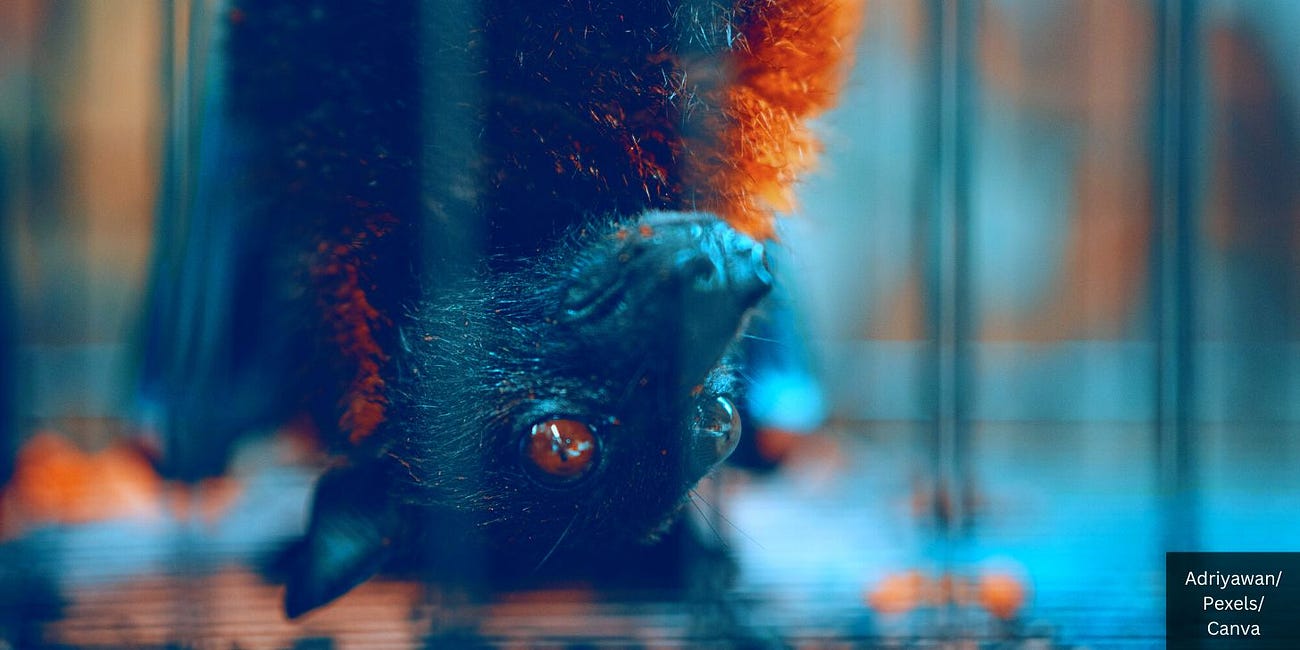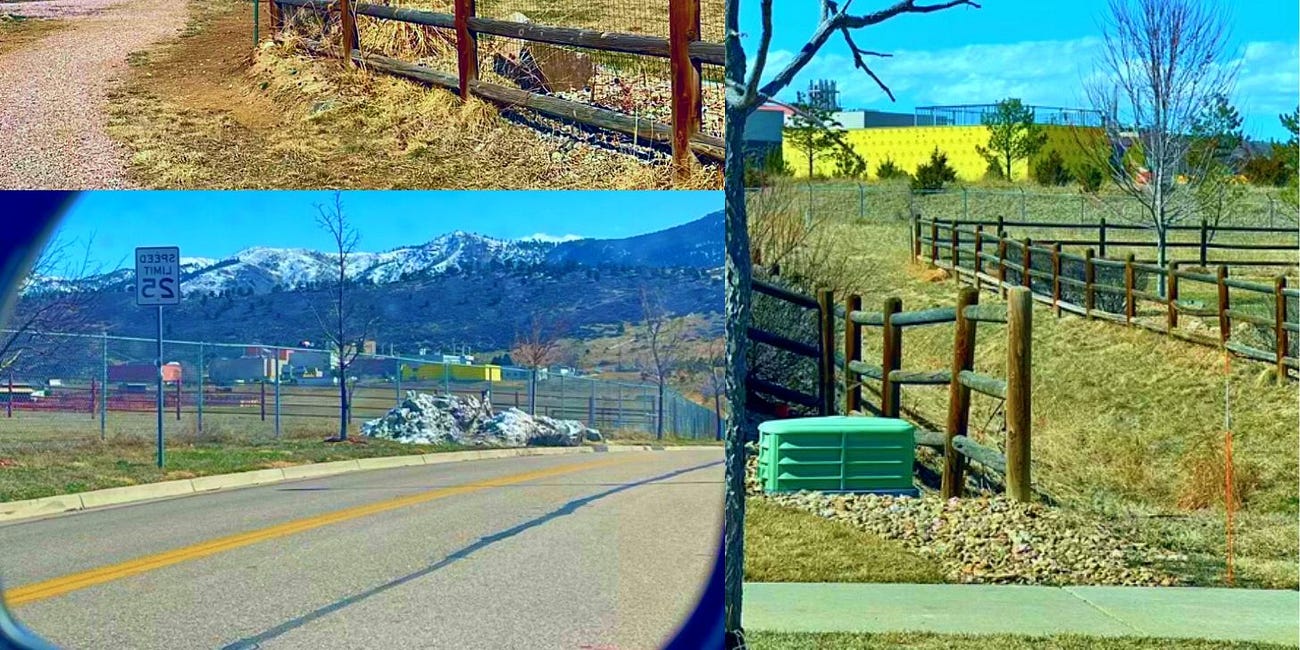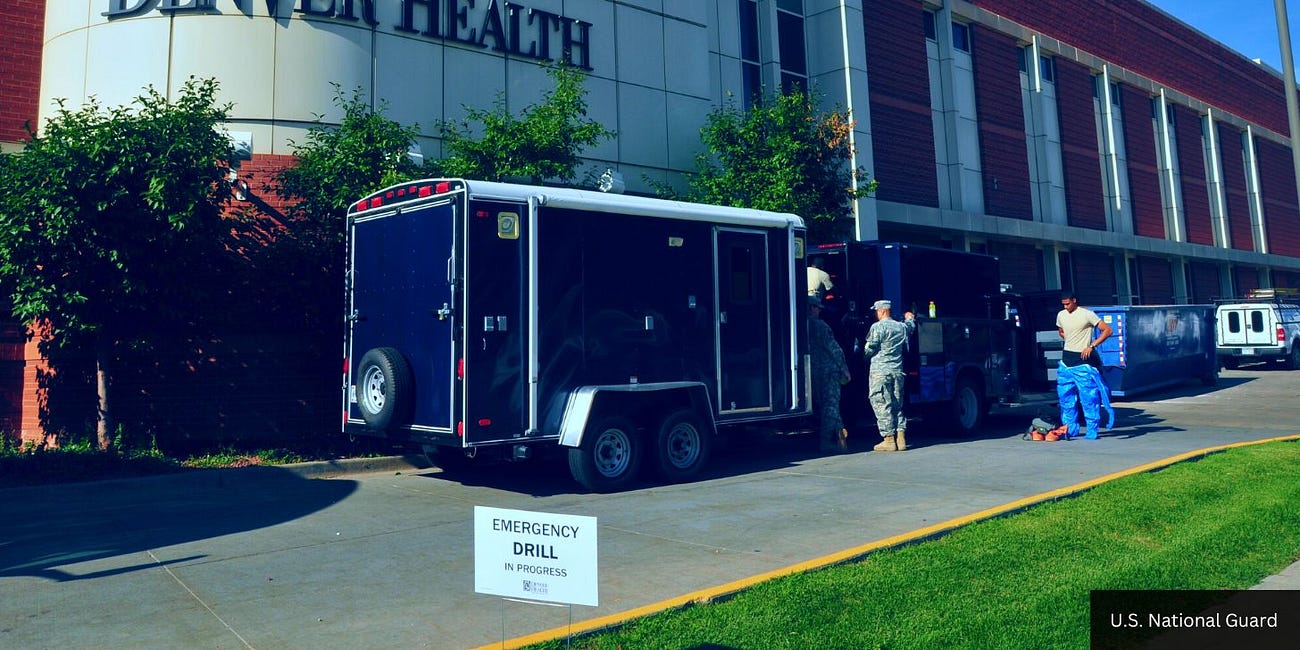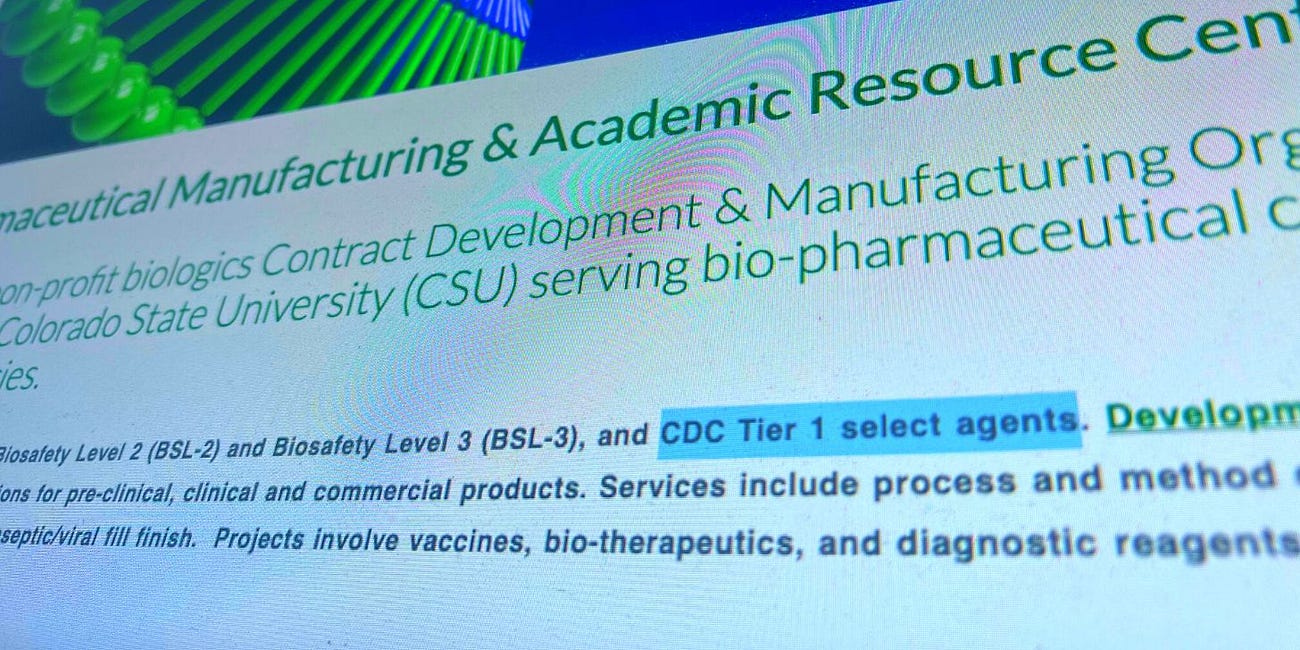Documents Reveal Over 50 Safety Incidents at CSU's Virus Lab Amid New Bat Research Facility Construction
Freedom of Information Act (FOIA) request uncovers infected researchers, animal bites, and pathogen mishandling at taxpayer-funded laboratory.
Documents obtained through a Freedom of Information Act (FOIA) request by the White Coat Waste Project (WCW) have exposed a series of alarming safety incidents at Colorado State University (CSU) in Fort Collins.
Follow Jon Fleetwood on Instagram @realjonfleetwood / Twitter @JonMFleetwood
CSU is the location of a new 11,000 sqft bat research laboratory that will experiment on dangerous diseases, potentially including Ebola, Nipah virus, and COVID-19.
The lab’s construction is currently underway and is expected to be completed by December 2024.
CSU has a history of safety failures, including at least two significant lab accidents (here) that occurred in May 2014.
In the first incident, a CSU researcher mishandled genetically modified Burkholderia pseudomallei bacteria, which are highly dangerous, by moving them to a less secure lab without confirming their deactivation, leading to potential exposure.
In the second incident, a mishap involving tuberculosis bacteria occurred due to improper handling of infected material, posing a risk to others, though both incidents were contained without any reported infections.
What the New Documents Show
The newly uncovered safety incidents occurred between 2020 and 2023 and involved the mishandling of dangerous pathogens, leading to researchers being infected.
The new documents detail at least 50 incidents at the taxpayer-funded lab, which include instances where staff were bitten by hamsters carrying the COVID virus, exposed to tuberculosis-infected mouse blood, and scratched by cats with rabies.
These events happened despite the lab’s role in handling some of the world’s most lethal viruses, highlighting significant lapses in safety controls.
Notably, these incidents were not disclosed to the public, raising significant transparency concerns.
“Dozens of laboratory accidents at CSU have become known only because of a public records request,” Dr. Bryce Nickels, a genetics professor at Rutgers University and co-founder of Biosafety Now said. “This is ridiculous, and once again underscores a disturbing lack of transparency. Irrespective of their funding sources, researchers have an ethical obligation to report any lab accidents that could pose risks to the public.”
CSU claims the increase in accidents is due to the heightened stress and urgency brought about by the COVID pandemic, with university officials noting that the need to minimize time on campus may have led to rushed procedures.
Despite this explanation, the pattern of incidents persisted into 2023, suggesting systemic issues with the lab’s safety culture.
The variety of accidents recorded includes exposure to various diseases such as chronic wasting disease, tuberculosis, rabies, and MERS (Middle East Respiratory Syndrome):
On two separate occasions in 2020, researchers working with hamsters infected with SARS-CoV-2 were bitten by the rodents.
Another incident in 2020 involved a researcher contracting the Zika virus after experimenting with infected mosquitoes.
An August 2022 report mentioned a researcher experimenting on a mouse infected with a highly infectious strain of tuberculosis being splashed in the face with contents of a syringe, which contained a solution and possibly the animal’s blood, while wearing only “eye protection.”
In late 2022, a bat infected with MERS-CoV bit a researcher while being put back in its cage.
Multiple incidents of researchers being scratched by rabies-infected cats and other lab accidents were reported between May 2020 and July 2023.
Incidents involving improper storage or spilling of viral samples, researchers cutting themselves with tools, and finding a biohazard bag full of dead mice outside were mentioned within the time frame of 2020 to 2023.
In 2021, the university had to notify the CDC about unknown samples that researchers found, and two researchers were bitten by a mouse infected with chronic wasting disease (CWD) and tuberculosis (TB).
Follow Jon Fleetwood on Instagram @realjonfleetwood / Twitter @JonMFleetwood
Additionally, the documents reveal that the university faced fines for violating the Animal Welfare Act, with inspectors finding inadequate protection and care for animal subjects.
CSU was fined $5,800 by the U.S. Department of Agriculture (USDA) in April 2022 for violations between 2019 and 2022 after finding.
The agency claims CSU researchers “failed to protect animals from discomfort and physical harm.”
The revelations have sparked criticism from public figures, including Senator Joni Ernst (R-Iowa), who warned, “Lab leaks are inevitable and we don’t want the next outbreak to happen in our own backyard or near our military bases.”
Opposition to CSU’s New Bat Research Facility
These concerns are further amplified by the construction of CSU’s new bat research facility, a collaboration between the university, the U.S. National Institutes of Health (NIH), and EcoHealth Alliance (EHA), despite the lab’s troubling history of accidents.
EHA is the group at the center of the COVID lab leak theory.
The group’s Dr. Peter Daszak channeled millions of American taxpayer dollars to fund risky gain-of-function research on bats at the Wahn Institute of Virology (WIV) in Wuhan, China, where the COVID pandemic is believed to have originated.
Justin Goodman, senior vice president of WCW, criticized the project: “The taxpayer-funded bat lab being built by Colorado State University in collaboration with the NIH and infamous Wuhan lab funder EcoHealth Alliance is a waste of money and a threat to public health,” he said.
Christine Wright Bowman, administrator for the grassroots organization ‘Covid Bat Research Moratorium of Colorado’ (CBRMC), is hopeful about her group’s campaign to halt construction on the new lab.
“Until construction is actually completed, we have time to convince the people of Fort Collins, and this nation, that we should be concerned about the safety of this research,” Bowman said. “People are beginning to understand the fact that Covid was an engineered virus that leaked from a lab, a lab very much like this one, funded by the same organization.”
The admin is calling for nationwide action: “I would invite everyone, no matter where they live, to contact their senators and representatives, asking them to stop this kind of research from going forward in the United States,” she continued. “The potential of having another deadly disease leak from a lab is overwhelming. We need to stop this now. CSU will not stop voluntarily. We need the help of Congress.”
Follow Jon Fleetwood on Instagram @realjonfleetwood / Twitter @JonMFleetwood
New Bat Lab Proposed Despite CDC's Past 'Serious Safety Violations While Working with Bioterror Pathogens' in Colorado
A new taxpayer-funded laboratory is being built in Fort Collins, Colorado that will import bats from around the world and experiment on dangerous diseases, potentially including Ebola, Nipah virus, and COVID-19.
New Images Show Colorado Bat Lab Construction Underway Despite Safety Concerns
Construction has begun on a new laboratory at Colorado State University’s (CSU) Foothills Campus in Fort Collins, despite significant safety concerns.
Ebola Vaccine That 'Sheds' in 31% of Vaccinated Given to Colorado Healthcare Workers Just Down the Road from New Bat Lab
Editor’s note: This article’s headline has been updated to clarify that the FDA inset for Merck’s ERVEBO Ebola vaccine states that the vaccine “sheds” in more than 31% of those vaccinated with the drug. The prior headline said that the vaccine “‘Sheds’ Onto/Infects Others 31% of the Time.” It is more precise to simply say that the vaccine “sheds” in 31%…
New Colorado Bat Lab Location CSU Confirmed to Develop ‘CDC Tier 1 Select Agents’ Like Ebola Despite University's Denials
As health workers in Denver, Colorado receive doses of a “shedding” and live virus-containing Ebola vaccine, concerns have been raised over a new bat research facility to be built just up the road, at Colorado State University (CSU) in Fort Collins.
12 Maryland Hospitals Received Ebola 'Pathogen Training' Just Before COVID-19 Outbreak: Journal 'Health Security'
A new study published online Friday by Johns Hopkins researchers in Health Security—a peer-reviewed journal researching epidemics and disasters—confirms that healthcare workers at the Maryland Department of Health have received “special pathogen training” for Ebola.










OMG. If they don't get us one way, they'll do it another. Depopulation very successful.
I wouldn’t expect any help out of Congress. The most they’ll provide is lip service, as they’ve shown ZERO concern for Americans safety.